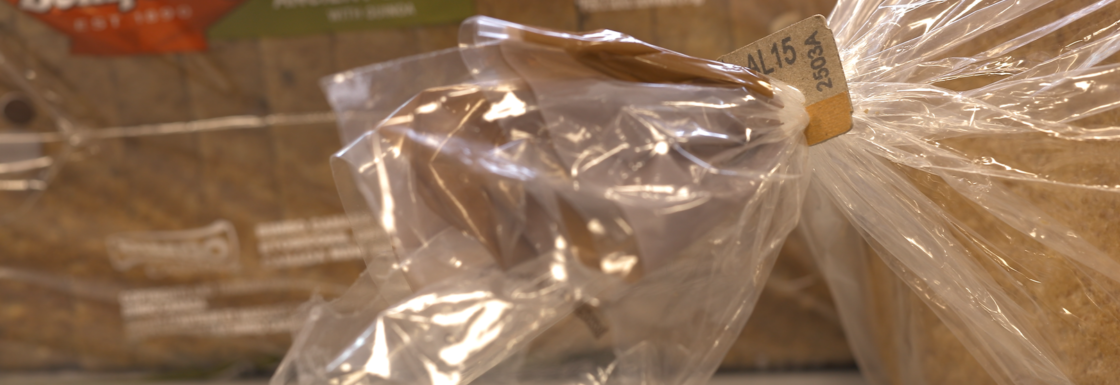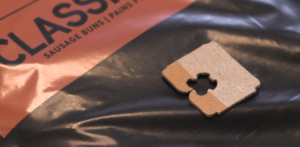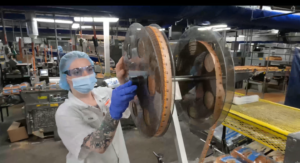Transitioning Plastic Bread Bag Closures to Compostable Cardboard

Projects Sponsor
Canada’s largest and oldest bakery, Bimbo, have set themselves an ambitious but attainable sustainability target. The goal is to ensure 100% of Bimbo packaging is reusable, recyclable, biodegradable or compostable by 2025. Today they’re moving towards that goal at a good clip, with a good clip.
Bimbo’s innovative cardboard bread bag closure will eliminate 200 metric tonnes of plastic bread bag clips annually. That’s like keeping the weight of 32 adult elephants out of landfill and Bimbo Canada is moving the baking industry in the right direction and has challenged all bakers in Canada to make their plastic clips toast as well.

A single cardboard clip on a sausage bag
Bimbo is Canada’s oldest and largest bakery and they’ve made a commitment that, by 2025, 100% of their packaging will support a circular economy by being reusable, recyclable, biodegradable, or compostable.
Today, they’re moving towards that goal at a good clip, with a good clip. Bimbo is ditching the single use plastic bread clip most of us know so well and transitioning to a new, innovative cardboard bread bag closure.
At first glance, replacing plastic bag clips may seem like a low-impact change to make but those clips add up.
Or line up, or at least if you were to line them up, a year of Bimbo’s plastic bread clips would stretch over 10,000 km. That means you could run them from Vancouver, BC to St. John’s, NFLD, and only to run out of space and have to loop your bread clip trail all the way back again.
That’s a lot of non-recyclable plastic. In fact, eliminating plastic bread clips from their operations will reduce Bimbo’s single use plastic by two hundred metric tonnes annually so, not low-impact, or low-effort.
Coming up with a bread clip for the circular economy age took some doing.
The clip project was first initiated by a member of Bimbo’s Continue Improvement team who—alert to sustainable initiatives—heard about a similar innovation in Australia.
Soon, the Continue Improvement team was collecting data to determine if the move aligned with the company’s circular economy goals while engaging the appropriate people internally to gain support for the initiative.
Once that potential benefit had been established, and buy-in achieved, the real world real work began.
A business case to purchase new cardboard bag closures for all the company’s bakeries across Canada was developed. A supplier, KLR, was found and the cardboard tags needed to be lab tested. It was important to understand the tear, tensile, elongation of and other attributes, as well as hardwood/softwood mixture of the fibre bag closures. They needed to be able to hold up in the refrigerator, hold up in people’s hands and, of course, do the job. Creating more food waste was not the project’s goal.
Once the clips had earned their claps, plans for phasing them were rolled out. Bimbo is the first company in Canada to take a crack at the clip and this took considerable investment. The machines used for the plastic bag closures meant Bimbo needed to purchase all new machines—a total of seventy-one bag closures and inkjet printers for an investment of $1.8 million. That’s all straight investment, with no return or gained efficiencies and that meant selling the company’s leadership and the global parent company on “doing the right thing” for the planet.
Which, significantly, they agreed to do.
Staff training had to be provided and the operational challenges involved in any such shift needed to be addressed. Adapting to the new bag closures required Bimbo to stop production for installation and then they needed to ensure they ran smoothly. A strong partnership with KLR, who assisted in finding solutions, has been a real boon to the project.

Cardboard Clips Roll Replacement
The ongoing supply chain challenges facing all industries today were an issue here as well. Indeed the final implementation—at Stonemill bakery in Toronto—is currently delayed as Bimbo waits for a spare part but it’s a wait that will prove worth it.
Bimbo is a leader in the circular economy and they want to keep their customers in the loop. A video was created to launch the project to help educate consumers about what to do with the new cardboard bag closures—which are all produced in Canada and made from 100% recycled cardboard.
The project, while it brings Bimbo closer to their sustainability goals, is easily imitated by others and that’s what they want. In fact, Bimbo has challenged all bakeries in Canada to rise to the challenge and make their plastic clips toast as well.













